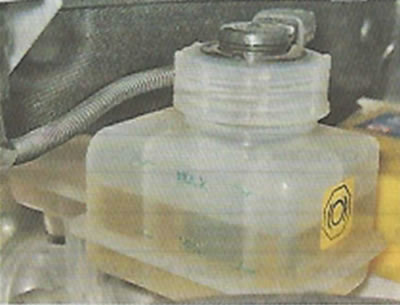Attention! Familiarize yourself with the safety precautions for handling brake fluid.
The brake fluid level is checked periodically: daily during the operation of the vehicle, at each maintenance, after the operation of bleeding the hydraulic drive of the brake system and replacing the brake fluid, when the control lamp on the instrument panel lights up, indicating an insufficient level of brake fluid in the reservoir of the main brake cylinder.
Execution sequence
1. We prepare the car for work («Preparing the car for maintenance and repair»).
2. With a rag we remove dirt from the reservoir of the main brake cylinder.
3. Visually check the level of brake fluid in the reservoir. It should be between the MIN and MAX marks on the reservoir body.

4. We check the degree of wear of the brake pads of the front and rear brake mechanisms (see «Brake pads - wear check»).
5. If the wear of the brake pads is within normal limits, and the fluid level in the reservoir is below the MIN·mark, then disconnect the tip of the wiring harness from the brake fluid level emergency drop sensor, unscrew and remove the reservoir cap («Brake fluid low level sensor - check and replace»).
Warning! To fill the hydraulic drive of the brake system, use only new fluid.
6. Add new brake fluid to the reservoir up to the MAX mark (when installing the reservoir cap, the float of the sensor will be immersed in the liquid and its level will rise).
Warning! If the brake fluid in the reservoir has to be topped up frequently, then it is necessary to check the tightness of the brake system (visually checked for signs of leakage of brake fluid from the cylinders and joints of the system elements).
7. Tightly close the tank lid.
8. Connect the wiring harness block to the sensor connector.
9. We check the operation of the brake fluid emergency level sensor: with the ignition on, we press on top of the rubber lining of the reservoir lid. If the sensor is OK, the control lamp on the instrument panel will light up.
